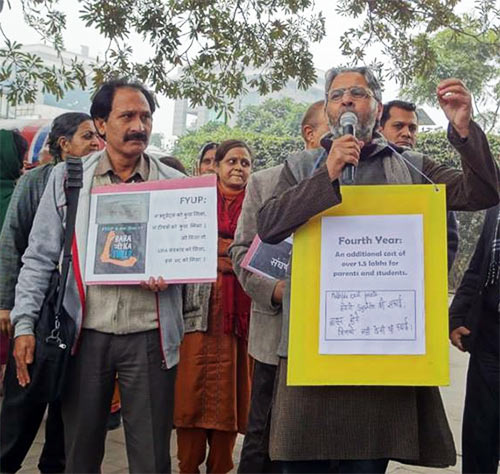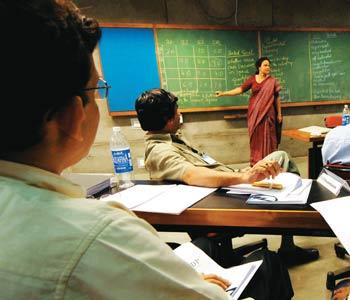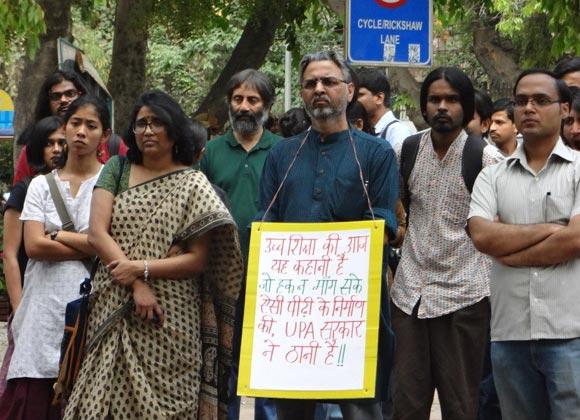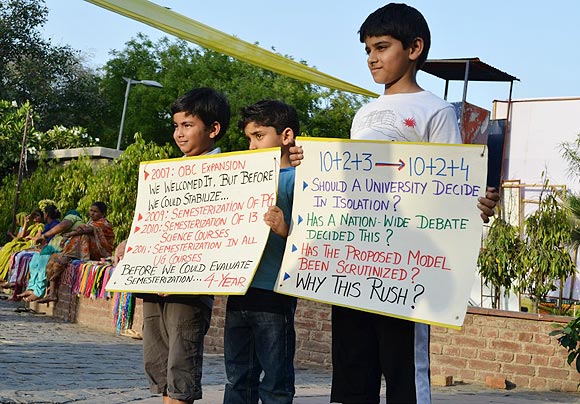 | « Back to article | Print this article |
Will the new HRD minister scrap DU's four year programme?
Among the many promises the BJP government made during the polls, a prominent one was to roll back the Delhi University's four year undergraduate programme.
The brainchild of the UPA government, the FYUP received flak ever since it was first announced and has continued to disappoint a section of teachers even after a year since it was implemented.
Those opposing the idea are unhappy with the haste and lack of efficiency in the four year programme.
While the debate continues, the question is: Will the new HRD minister Smriti Irani deliver its promises? Read on for details...
The roads leading to Delhi University's North Campus are packed with aspirants seeking to win a seat among the 150,000 available at its 70 constituent colleges.
'Admission forms are available online' says a notice inside St Stephen's College, which boasts of an illustrious alumni list, which includes late writer Khushwant Singh and Diageo chief executive Ivan Menezes among others.
Nandita Narain, mathematics teacher at the college, is seething and excited -- both at the same time.
Excited because she met the new minister in-charge of education, Smriti Irani, who gave a teacher-student group, of which Narain was a part, a fair hearing. Seething because in four years, the vice-chancellor of Delhi University, Dinesh Singh, himself a graduate of St Stephen's, has not met the Delhi University Teachers' Association (DUTA), even once for a dialogue.
DUTA is an elected body of teacher representatives, sometimes with political affiliation; it once boasted of Amartya Sen as an office holder. Narain is the president of the association.
The association, for now, wants reversal of two decisions implemented by the United Progressive Alliance (UPA) government: a semester system and a four-year undergraduate programme (FYUP). Both were opposed by the association, and dissented to by the academic council, the highest body of Delhi University academia through which every reform must pass.
Delhi University followed an annual examination system till 2010, borrowed from British universities. Its undergraduate programmes were of three years, with specialisation beginning from the first year of study itself.
Under FYUP, all students go through 12 foundation courses in subjects such as history, geography, English, Hindi, maths, science and commerce in the first two years.
Though an undergraduate can choose to specialise in, say maths, she spreads herself too thin, say teachers.
"The idea of an english graduate learning prime numbers is great. But he is learning very little English," said Narain, voice laced with sarcasm.
Please click NEXT to continue reading...
'The semester system was pushed down our throats in 2010'
Long road to reform
Delhi University, for a long time in the 80s and 90s, was stuck in a time warp, with out-of-date curricula and a system of subsidiary courses along with every specialisation.
Only annual written examinations counted.
Subsidiary subjects required a passing score and were neglected.
In the decade starting 2000, change came in.
Internal assessment of students, which means scores based on class attendance, assignments and participation, began to make its presence felt.
From 2003, one-fourth of a student's score was based on assessment by a teacher, scores that went to a moderation committee to check bias.
Also, in a complicated two year process, the university's 70 colleges, divided into departments and faculties, participated in an overhaul of syllabi of all courses to make them contemporary.
Subsidiary courses were changed to make their scores count and offer a wider range of subjects with ultimate choice with the student.
A bachelor's programme called BA (pass) was upgraded to a BA.
These reforms were cleared by the academic council.
Teachers say what followed is the disturbing part.
Two successive vice-chancellors, appointed by UPA government, rode roughshod over the academic council.
Former vice- chancellor Deepak Pental introduced the semesters, while vice- chancellor Singh ushered in the FYUP.
"The semester system was pushed down our throats in 2010. They started using methods to shut us up. Show cause notices," Narain said.
"We are not used to this, you know, we are teachers. Our job is to teach students dissent".
A show-cause notice is one step away from firing.
The centralised exam, the weakest link in the university system -- internal assessment was meant to counter that -- would now be repeated twice a year.
An academic council meeting on December 24, 2012 cleared the FYUP.
"A blueprint was circulated to members two days before the meeting," Narain added.
A dissenter in the academic council, Sociology Department teacher Satish Deshpande who was then the department's dean, said he opposed the FYUP on academic grounds.
"It was an incoherent curriculum, implemented in an authoritarian and hurried manner," Deshpande said.
Please click NEXT to continue...
'The semester system was pushed down our throats in 2010'
Teacher participation
Not all are vehemently opposed to FYUP.
"The idea is good. The foundation courses give a lot of leeway to a teacher on how to handle a topic. For instance, I can teach about communalism through a story, a poem or an essay," said Pallav Nandwana, who heads the Hindi department at Hindu College.
He says FYUP, unlike the traditional graduation courses, allows students to do stuff, such as a project where his students visited and researched the Harijan Sevak Sangh, a concept started by Mahatma Gandhi, and its relevance.
Nandwana's point is borne out. In an earlier interview, an alumnus of St Stephen's said she did not enjoy her graduation programme because it meant just sitting in class.
FYUP stood a better chance of success, says Nandwana, if it had been brought in through proper channels such as debate in the academic council. "It has got a bad name," he said.
"They are teaching something which is useless, we are studying the basic thing," said Joshua Roy, 19, who joined FYUP a year ago, and plans to graduate in history.
"I did a project on physical and chemical properties of water, you get the picture. And someone who is aiming to specialise in Physics is also doing the same project."
"Something substantial should be added to the course, and option to choose between these subjects," said Roy, who said he did not want to study urbanisation to graduate in history, and wanted more rigour in the course to compete in the high-stakes civil services exam.
But improving the curriculum and adding to the course can happen only if Vice- Chancellor Singh negotiates with teachers.
An e-mail to his office did not get a response, his office said he was busy.
At Irani's request, he has broken the ice by meeting DUTA. Maybe a non-coercive meeting of the academic council can save FYUP.
Building bridges with teachers can also happen by improving infrastructure at Delhi University; teachers have for long struggled with problems that include not having individual desks to work on.
An improved conversation can also tackle the complex issue of teacher absenteeism, something for which the DUTA says it has suggestions.
Will the BJP government deliver its poll promises?
Delhi University: A long road of reforms
The university, which offers 150,000 seats in 70 constituent colleges, introduced several reforms in the decade starting 2000.
These changes were cleared by the Academic Council, the highest body through which every reform must pass:
- Internal assessment. One-fourth scores come from class assignments, projects, attendance, participation. This reduced stress on a year-end centralised examination system.
- An overhaul of syllabi in all courses, a two-year process involving all faculties and departments
- Weightage and re-naming of subsidiary courses, with wider choice.
The DUTA opposed and Academic Council dissented on two major changes pushed by the UPA government:
- A semester system started in 2010
- The four-year undergraduate programme started in 2013
Will the programme face the axe?
Under the four-year undergraduate programme or FYUP, all undergraduates study 12 foundation courses on various subjects, and a few applied courses such as "Mind, Body and Heart" as against an earlier three-year graduation with greater emphasis on specialisation.
Teachers feel that the FYUP curriculum is incoherent and has been implemented in a hurried and coercive manner.
Since Smriti Irani took over as the HRD minister, there has been growing speculation that FYUP will be scrapped, a poll promise of the Bharatiya Janata Party (BJP).
The Times of India on Thursday reported Irani will proceed with caution to avoid any controversy, but that backroom negotiations with BJP-affiliated teacher groups have resulted in a decision that the programme will be scrapped.
Irani met DUTA president Narain, as part of a meeting with a student-teacher group, and also asked Vice-Chancellor Dinesh Singh to meet the DUTA, his first meeting with the association in four years.




